 Backend Development
Backend Development
 PHP Tutorial
PHP Tutorial
 What are the differences between php7 and php5? Comparison between php5 and php7
What are the differences between php7 and php5? Comparison between php5 and php7
What are the differences between php7 and php5? Comparison between php5 and php7
This article introduces to you what is the difference between php7 and php5? The comparison between php5 and php7 has certain reference value. Friends in need can refer to it. I hope it will be helpful to you.
PHP7来一发
It has been a year and a half since PHP7 was officially released. When it debuted, it was claimed to be several times faster than the old version. Various open source frameworks or The speed and efficiency of the system running on PHP7 have increased several times. Anyway, both the media and developers are fanning the flames. No, they should be full of praise.
I will just watch you show off quietly and say nothing.
Generally, I am the last person to upgrade mobile phone systems because I don’t want to step into the trap. After all, systems like iOS and Android will have bugs, not to mention the most hacked languages in the world.
The time has come today to see if PHP7 is as awesome as the legend says.
Install two PHP versions
http://www.php.cn/ The latest version of PHP7 is already available, you can download it yourself.
In order to test the performance of PHP5 and PHP7 (PHP6 has been abandoned, distressed 1s), I installed two php versions in different directories.
The installation process is skipped. Regardless of source code installation or package management tool installation, just remember your own path.
PHP7:
# /usr/local/php7/bin/php -v PHP 7.1.5 (cli) (built: May 13 2017 23:36:41) ( NTS ) Copyright (c) 1997-2017 The PHP Group Zend Engine v3.1.0, Copyright (c) 1998-2017 Zend Technologies
PHP5:
# /usr/bin/php -v PHP 5.6.30 (cli) (built: Jan 19 2017 22:31:39) Copyright (c) 1997-2016 The PHP Group Zend Engine v2.6.0, Copyright (c) 1998-2016 Zend Technologies
Environment description: In order to ensure the best test effect, this test is conducted directly in the production environment, which is closer to the real situation.
Operating system: CentOS 7.2 64-bit
Basic configuration: 1 core 1GB 1Mbps
Host brand: Tencent Cloud
Showdown between PHP7 and PHP5
1. Pure php script test
vim test.php
$arr = array();
for ($i = 0; $i < 500000; $i++) {
$arr[$i] = $i;
}
$tmp = array();
foreach ($arr as $i) {
if ($i % 2 == 0) {
$is_exists = array_key_exists($i, $arr);
if ($is_exists) {
array_push($tmp, $i);
}
}
}PHP5 version test:
time /usr/bin/php test.php real 0m0.301s user 0m0.239s sys 0m0.050s -------------------------- time /usr/bin/php test.php real 0m0.310s user 0m0.241s sys 0m0.054s -------------------------- time /usr/bin/php test.php real 0m0.289s user 0m0.238s sys 0m0.050s
PHP7 version test:
time /usr/local/php7/bin/php test.php real 0m0.087s user 0m0.063s sys 0m0.024s ------------------------------------- time /usr/local/php7/bin/php test.php real 0m0.106s user 0m0.073s sys 0m0.033s -------------------------------------- time /usr/local/php7/bin/php test.php real 0m0.083s user 0m0.061s sys 0m0.022s
It can be seen from the data that the pure PHP script test shows that the performance of PHP7 has been improved by 3 to 4 times.
2. PHP database operation test
First we create a user table:
Table: test_user Create Table: CREATE TABLE `test_user` ( `uid` int(11) NOT NULL AUTO_INCREMENT, `name` char(100) NOT NULL DEFAULT '', PRIMARY KEY (`uid`) ) ENGINE=InnoDB AUTO_INCREMENT=1 DEFAULT CHARSET=utf8
Insert a piece of data into the test_user table:
insert into test_user (uid,name) values (1,"dada"); MariaDB [test]> select * from test_user; +-----+------+ | uid | name | +-----+------+ | 1 | dada | +-----+------+
Create the database test script test_db.php and ensure that both your PHP versions have the PDO extension installed.
/usr/bin/php -m|grep pdo pdo_mysql pdo_sqlite /usr/local/php7/bin/php -m|grep pdo pdo_mysql pdo_sqlite
My two PHP versions have PDO installed (do not use the php_mysql extension anymore, it is outdated, PHP7 has been completely abandoned, and mysqli is not recommended).
Next we write a script through PDO to test the performance comparison of select execution 500,000 times:
$host = "yourHost";
$user = "yourUser";
$pass = "yourPass";
$db = "test";
$port = 3306;
try
{
$dbh = new PDO("mysql:host=$host;dbname=$db", $user, $pass);
echo "Connected<p>";
}
catch (Exception $e)
{
echo "Unable to connect: " . $e->getMessage() ."<p>";
}
$sql = "select SQL_NO_CACHE * from test_user;";
$tmp = array();
for ($i=1; $i<=500000; $i++) {
$ret = $dbh->query($sql);
foreach ($ret as $row) {
$tmp['id'] = $row['id'];
$tmp['name'] = $row['name'];
}
}PHP5 test test_db.php:
time /usr/bin/php test_db.php real 0m48.396s user 0m11.149s sys 0m3.998s real 0m51.447s user 0m11.800s sys 0m4.395s real 0m51.517s user 0m11.733s sys 0m4.439s
PHP7 test test_db.php:
real 0m47.900s user 0m9.875s sys 0m4.130s real 0m46.977s user 0m9.760s sys 0m3.983s real 0m50.010s user 0m10.268s sys 0m4.307s
This time the script executed 500,000 queries. The user execution time of the script executed by PHP7 is almost one second less than that of PHP5! It's one second less, not one millisecond.
3. PHP framework test
thinkphp
Domestic affirmation It is the first choice thinkphp framework, choose the latest thinkphp5. I downloaded the thinkphp5.0.9 version directly from the official website.
(1) Framework entry test
Test under PHP5:
time /usr/bin/php ./public/index.php real 0m0.036s user 0m0.026s sys 0m0.010s real 0m0.038s user 0m0.026s sys 0m0.012s real 0m0.041s user 0m0.032s sys 0m0.009s
Test under PHP7:
time /usr/local/php7/bin/php ./public/index.php real 0m0.027s user 0m0.021s sys 0m0.005s real 0m0.027s user 0m0.018s sys 0m0.009s real 0m0.025s user 0m0.023s sys 0m0.002s
In the entrance test, you can see that there is not much difference between PHP and PHP7, but PHP7 is still slightly faster.
(2) Framework logic test
Reuse the logic of the first step at the framework entrance:
<?php
namespace app\index\controller;
class Index
{
public function index()
{
$arr = array();
for ($i = 0; $i < 500000; $i++) {
$arr[$i] = $i;
}
$tmp = array();
foreach ($arr as $i) {
if ($i % 2 == 0) {
$is_exists = array_key_exists($i, $arr);
if ($is_exists) {
array_push($tmp, $i);
}
}
}
}
}PHP5 version:
time /usr/bin/php ./public/index.php real 0m0.538s user 0m0.463s sys 0m0.072s real 0m0.454s user 0m0.386s sys 0m0.065s real 0m0.387s user 0m0.331s sys 0m0.055s
PHP7 version:
time /usr/local/php7/bin/php ./public/index.php real 0m0.150s user 0m0.123s sys 0m0.024s real 0m0.137s user 0m0.105s sys 0m0.031s real 0m0.123s user 0m0.096s sys 0m0.026s
When using the PHP7 version in the thinkphp framework, the performance improvement is approximately 4 times the PHP5 version!
laravel
Then we test the most popular PHP artist framework.
(1) Framework entry test
PHP5 version:
time /usr/bin/php ./public/index.php real 0m0.104s user 0m0.081s sys 0m0.022s real 0m0.148s user 0m0.122s sys 0m0.025s real 0m0.122s user 0m0.100s sys 0m0.021s
PHP version
time /usr/local/php7/bin/php ./public/index.php real 0m0.079s user 0m0.064s sys 0m0.015s real 0m0.081s user 0m0.067s sys 0m0.014s real 0m0.067s user 0m0.054s sys 0m0.013s
We can see that in the laravel framework entry test, the performance difference between PHP5 and PHP7 is not big, but even though PHP5 is the fastest The 0.081s is also slower than the slowest PHP7 version of 0.067s. So PHP7 is still better.
(2) Framework logic test
Try to add a little logic, like thinkphp, to reuse test logic.
First modify the laravel routing and directly call the index method of UserController:
Route::get('/', 'UserController@index');
Write the test logic in the index method:
public function index()
{
$arr = array();
for ($i = 0; $i < 500000; $i++) {
$arr[$i] = $i;
}
$tmp = array();
foreach ($arr as $i) {
if ($i % 2 == 0) {
$is_exists = array_key_exists($i, $arr);
if ($is_exists) {
array_push($tmp, $i);
}
}
}
}PHP5 version
time /usr/bin/php ./public/index.php real 0m0.510s user 0m0.377s sys 0m0.079s real 0m0.627s user 0m0.447s sys 0m0.091s real 0m0.519s user 0m0.436s sys 0m0.079s
PHP7 version
time /usr/local/php7/bin/php ./public/index.php real 0m0.201s user 0m0.167s sys 0m0.032s real 0m0.216s user 0m0.174s sys 0m0.040s real 0m0.169s user 0m0.134s sys 0m0.034s
PHP7 performance has been improved by 3 to 4 times
Stress test
1000 requests, 50 concurrency
PHP5 version:
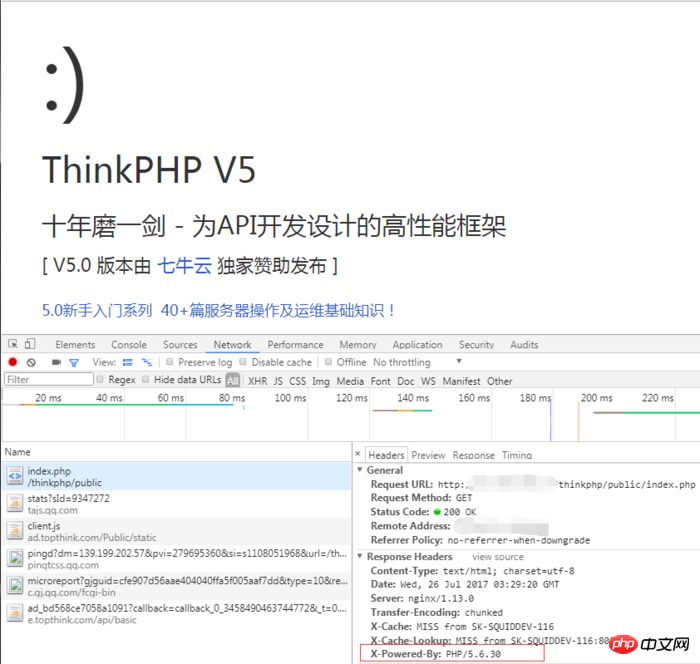
Three times the sample is as follows:
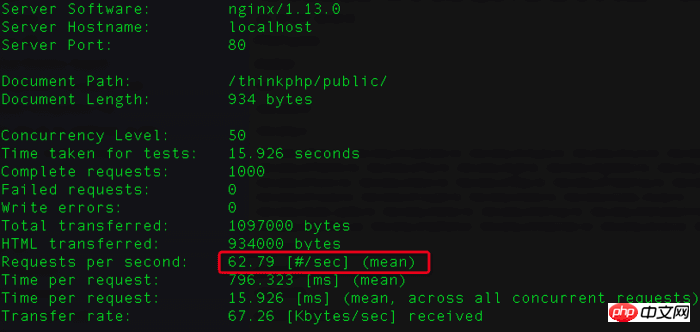
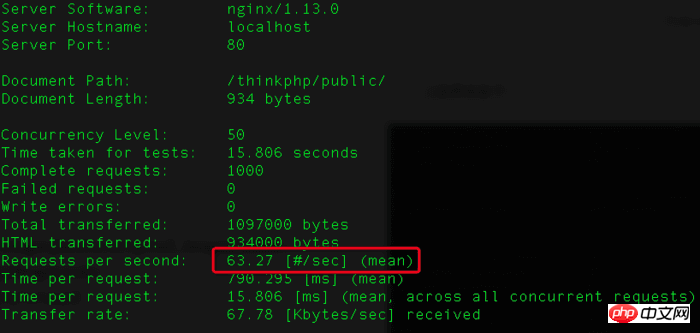
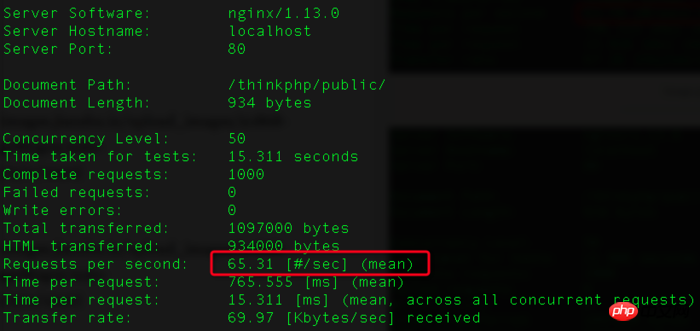
PHP7 version:
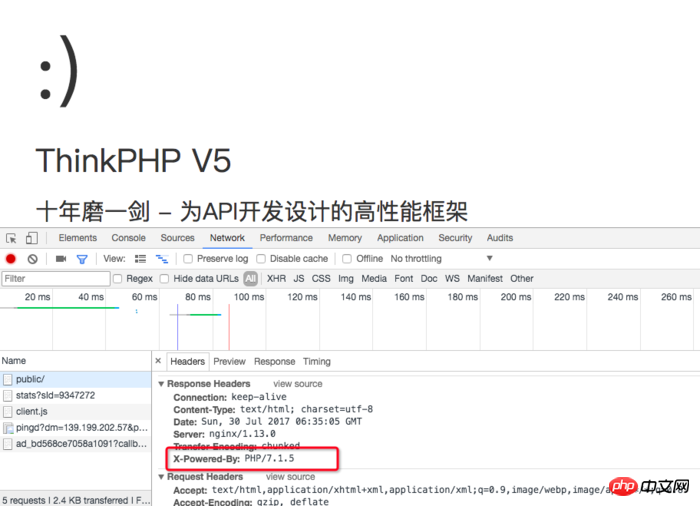
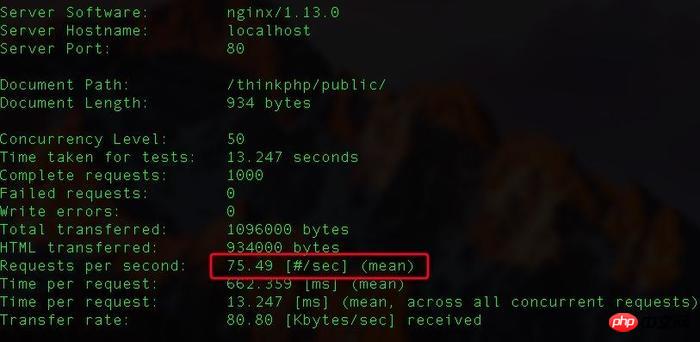
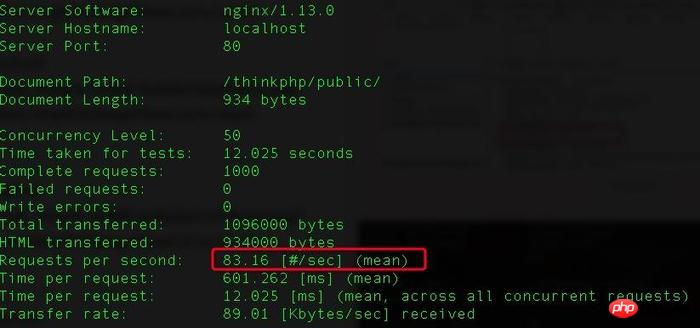
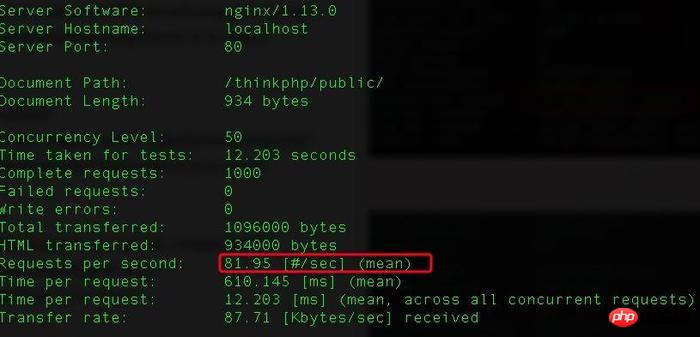
Through the stress test, under the PHP7 version, you can see the single request time and request completion time and The average actual running time of each connection request takes less time, and the most important performance indicator QPS is also higher than the PHP5 version.
Opcache performance test of PHP7
Enable opcache:
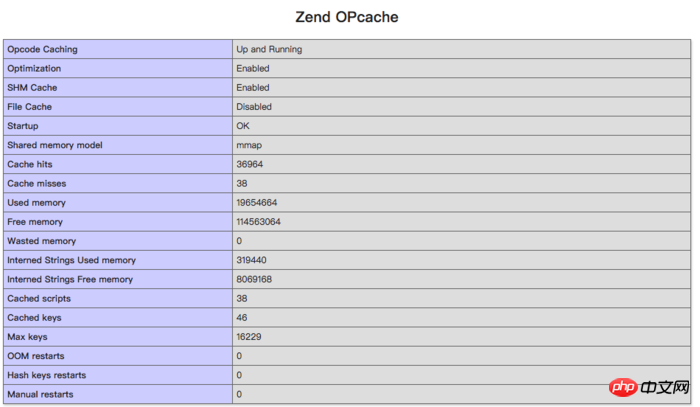
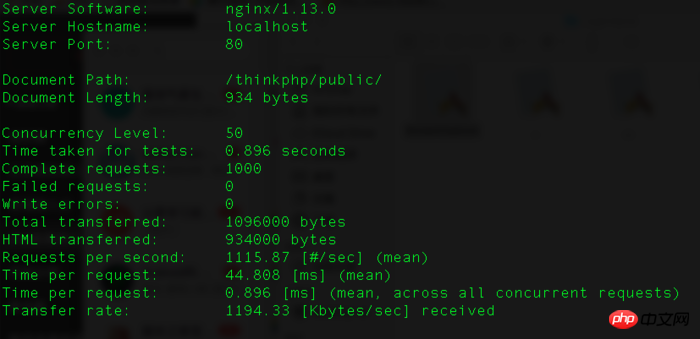
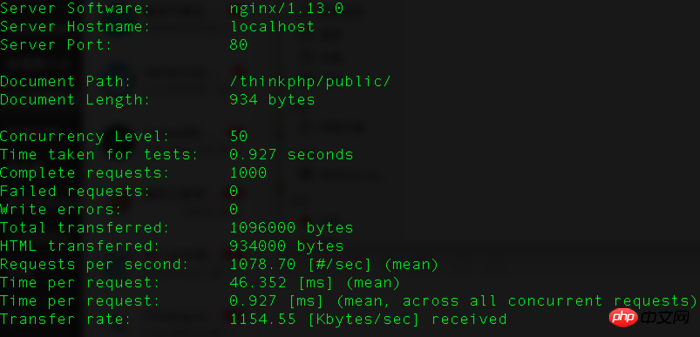
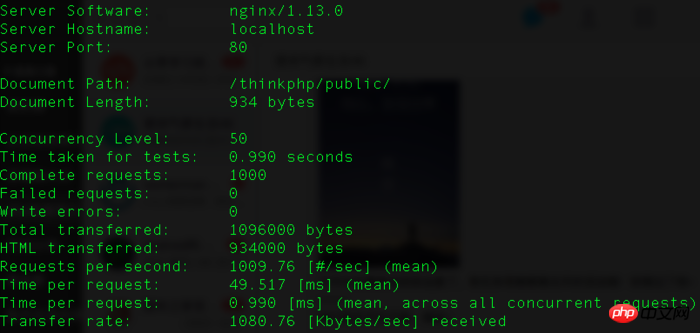
Damn it! PHP7 with opcache turned on is indeed about to take off. Compared with PHP7 that has not been turned on, the performance has improved by more than ten times, and compared with PHP5, it has improved by almost 20 times! Asking if you are afraid!
PHP script test data is as follows:

PHP7 vs PHP5.png
Pure PHP script test process, PHP7 performance is about PHP5 3 to 4 times.
The stress test data is as follows:
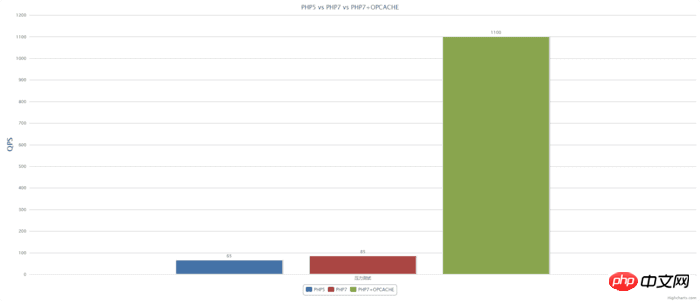
Explanation of the principle of the time function strtotime() in PHP
Comparison of ts and nts in PHP
The above is the detailed content of What are the differences between php7 and php5? Comparison between php5 and php7. For more information, please follow other related articles on the PHP Chinese website!

Hot AI Tools

Undresser.AI Undress
AI-powered app for creating realistic nude photos

AI Clothes Remover
Online AI tool for removing clothes from photos.

Undress AI Tool
Undress images for free

Clothoff.io
AI clothes remover

Video Face Swap
Swap faces in any video effortlessly with our completely free AI face swap tool!

Hot Article

Hot Tools

Notepad++7.3.1
Easy-to-use and free code editor

SublimeText3 Chinese version
Chinese version, very easy to use

Zend Studio 13.0.1
Powerful PHP integrated development environment

Dreamweaver CS6
Visual web development tools

SublimeText3 Mac version
God-level code editing software (SublimeText3)

Hot Topics
 1666
1666
 14
14
 1426
1426
 52
52
 1328
1328
 25
25
 1273
1273
 29
29
 1255
1255
 24
24
 Explain secure password hashing in PHP (e.g., password_hash, password_verify). Why not use MD5 or SHA1?
Apr 17, 2025 am 12:06 AM
Explain secure password hashing in PHP (e.g., password_hash, password_verify). Why not use MD5 or SHA1?
Apr 17, 2025 am 12:06 AM
In PHP, password_hash and password_verify functions should be used to implement secure password hashing, and MD5 or SHA1 should not be used. 1) password_hash generates a hash containing salt values to enhance security. 2) Password_verify verify password and ensure security by comparing hash values. 3) MD5 and SHA1 are vulnerable and lack salt values, and are not suitable for modern password security.
 PHP: A Key Language for Web Development
Apr 13, 2025 am 12:08 AM
PHP: A Key Language for Web Development
Apr 13, 2025 am 12:08 AM
PHP is a scripting language widely used on the server side, especially suitable for web development. 1.PHP can embed HTML, process HTTP requests and responses, and supports a variety of databases. 2.PHP is used to generate dynamic web content, process form data, access databases, etc., with strong community support and open source resources. 3. PHP is an interpreted language, and the execution process includes lexical analysis, grammatical analysis, compilation and execution. 4.PHP can be combined with MySQL for advanced applications such as user registration systems. 5. When debugging PHP, you can use functions such as error_reporting() and var_dump(). 6. Optimize PHP code to use caching mechanisms, optimize database queries and use built-in functions. 7
 PHP and Python: Comparing Two Popular Programming Languages
Apr 14, 2025 am 12:13 AM
PHP and Python: Comparing Two Popular Programming Languages
Apr 14, 2025 am 12:13 AM
PHP and Python each have their own advantages, and choose according to project requirements. 1.PHP is suitable for web development, especially for rapid development and maintenance of websites. 2. Python is suitable for data science, machine learning and artificial intelligence, with concise syntax and suitable for beginners.
 PHP in Action: Real-World Examples and Applications
Apr 14, 2025 am 12:19 AM
PHP in Action: Real-World Examples and Applications
Apr 14, 2025 am 12:19 AM
PHP is widely used in e-commerce, content management systems and API development. 1) E-commerce: used for shopping cart function and payment processing. 2) Content management system: used for dynamic content generation and user management. 3) API development: used for RESTful API development and API security. Through performance optimization and best practices, the efficiency and maintainability of PHP applications are improved.
 How does PHP type hinting work, including scalar types, return types, union types, and nullable types?
Apr 17, 2025 am 12:25 AM
How does PHP type hinting work, including scalar types, return types, union types, and nullable types?
Apr 17, 2025 am 12:25 AM
PHP type prompts to improve code quality and readability. 1) Scalar type tips: Since PHP7.0, basic data types are allowed to be specified in function parameters, such as int, float, etc. 2) Return type prompt: Ensure the consistency of the function return value type. 3) Union type prompt: Since PHP8.0, multiple types are allowed to be specified in function parameters or return values. 4) Nullable type prompt: Allows to include null values and handle functions that may return null values.
 The Enduring Relevance of PHP: Is It Still Alive?
Apr 14, 2025 am 12:12 AM
The Enduring Relevance of PHP: Is It Still Alive?
Apr 14, 2025 am 12:12 AM
PHP is still dynamic and still occupies an important position in the field of modern programming. 1) PHP's simplicity and powerful community support make it widely used in web development; 2) Its flexibility and stability make it outstanding in handling web forms, database operations and file processing; 3) PHP is constantly evolving and optimizing, suitable for beginners and experienced developers.
 PHP vs. Other Languages: A Comparison
Apr 13, 2025 am 12:19 AM
PHP vs. Other Languages: A Comparison
Apr 13, 2025 am 12:19 AM
PHP is suitable for web development, especially in rapid development and processing dynamic content, but is not good at data science and enterprise-level applications. Compared with Python, PHP has more advantages in web development, but is not as good as Python in the field of data science; compared with Java, PHP performs worse in enterprise-level applications, but is more flexible in web development; compared with JavaScript, PHP is more concise in back-end development, but is not as good as JavaScript in front-end development.
 PHP and Python: Different Paradigms Explained
Apr 18, 2025 am 12:26 AM
PHP and Python: Different Paradigms Explained
Apr 18, 2025 am 12:26 AM
PHP is mainly procedural programming, but also supports object-oriented programming (OOP); Python supports a variety of paradigms, including OOP, functional and procedural programming. PHP is suitable for web development, and Python is suitable for a variety of applications such as data analysis and machine learning.



